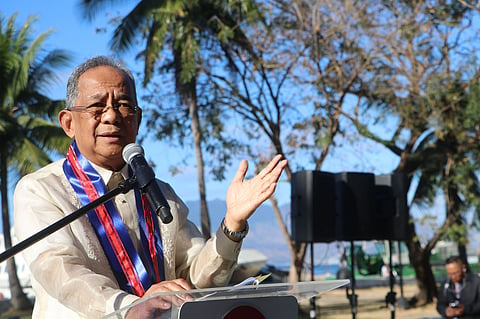
- NEWS
- the EDIT
- COMMENTARY
- BUSINESS
- LIFE
- SHOW
- ACTION
- GLOBAL GOALS
- SNAPS
- DYARYO TIRADA
- MORE

"This premier Freeport is now prepped and ready to become a prime area for global investments."
This was the statement made by Subic Bay Metropolitan Authority (SBMA) Chairman and Administrator Eduardo Jose L. Aliño on Friday, following the signing of the implementing rules and regulations (IRR) for the Corporate Recovery and Tax Incentives for Enterprises to Maximize Opportunities for Reinvigorating the Economy (CREATE MORE) Act.
Finance Secretary Ralph Recto, chair of the Fiscal and Incentives Review Board (FIRB), and Department of Trade and Industry (DTI) Secretary Ma. Cristina Roque, FIRB co-chair, signed the IRR of Republic Act 12066 at the Department of Finance on 17 February 2025.
Also present at the signing were Senator Sherwin Gatchalian, Special Assistant to the President for Investment and Economic Affairs Secretary Frederick Go, and National Economic and Development Authority (NEDA) Secretary Arsenio Balisacan.
“Now that the IRR for the CREATE MORE Act is signed, its back to work for us here in Subic Bay Freeport as we can now expect more foreign companies to invest here. This is certainly monumental since the IRR clarifies and refines the provisions the law’s smooth implementation,” Aliño said.
Aliño highlighted the investment-friendly provisions of the CREATE MORE Act, including options for investors to choose between the 5% Special Corporate Income Tax (SCIT) or Enhanced Deductions.
The law also provides more incentives for high-value investments exceeding P15 billion, particularly in import-substituting industries or export-oriented sectors. Additionally, Registered Business Enterprises (RBEs) will benefit from a lower Corporate Income Tax (CIT) rate of 20%, down from 25%, and an increase in the additional deduction on electricity expenses from 50% to 100%.
Aliño noted that tourism-related investments in Subic Bay Freeport will also gain incentives under the CREATE MORE Act, with SBMA providing an additional 50% deduction for trade fairs and tourism reinvestments until 2034.
Other key provisions of the law include:
Maximization of Net Operating Loss Carry-Over (NOLCO) by shifting the reckoning period from the "year of loss" to the "last year of the project’s income tax holiday (ITH) entitlement period."
Tax and duty exemptions on donations to public schools and government-owned and controlled corporations (GOCCs).
Flexible work arrangements for call centers operating within economic zones and Freeports, without compromising their tax incentives.
VAT benefits for export-oriented enterprises, ensuring that local purchases are VAT zero-rated while importations are VAT-exempt. VAT incentives will also be liberalized by shifting from the "direct and exclusive use" requirement to a more inclusive "directly attributable" standard for goods and services.
